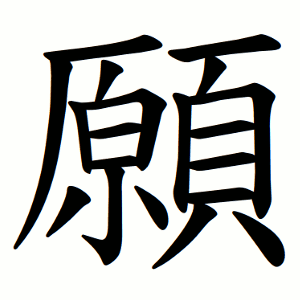願
- to wish, to desire, to pray, to vow;
Etymology
Usage in Korean
願望 (원망) — a wish, aspiration
祈願 (기원) — to pray or make a vow
悲願 (비원) — a noble vow; compassionate wish (esp. Buddhist)
宿願 (숙원) — a long-held wish or aspiration
自願 (자원) — voluntary, of one’s own accord
In Buddhist texts, 願 often conveys a deep spiritual vow, as in 發願 (“to make a vow”) and 大願 (“great vow”) — the sincere intention to save all beings.
Additional notes
In East Asian philosophy and religion, 願 represents more than a personal wish — it implies a vow aligned with virtue and compassion.
In Mahāyāna Buddhism, the Four Great Vows (四弘誓願) express the ultimate altruistic will to help all sentient beings.
In Confucian contexts, 願 embodies the moral will to act according to one’s ideals.
願
원할
원
wonhal
won
Kangxi radical:181, 頁 + 10
Strokes:19
Unicode:U+9858
Cangjie input:
- 一火一月金 (MFMBC)
Composition:
- ⿰ 原 頁
